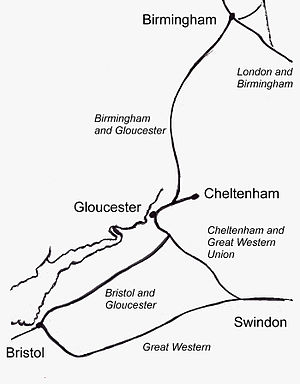- Cheltenham and Great Western Union Railway
-
The Cheltenham and Great Western Union Railway was a 7 ft 0 1⁄4 in (2,140 mm) broad gauge railway that linked the Great Western Railway at Swindon, Wiltshire, with Cheltenham, Gloucestershire, England. Much of the route is still in regular use today (see Golden Valley Line).
The line between Cheltenham and Gloucester was worked jointly with the Birmingham and Gloucester Railway, necessitating mixed gauge track and shared maintenance. The line between Gloucester and Standish Junction was owned by the C&GWUR, but the Bristol and Gloucester Railway had running rights over it. The Bristol and Gloucester Railway and 4 ft 8 1⁄2 in (1,435 mm) standard gauge Birmingham and Gloucester Railway then merged, and were then quickly taken over by the Midland Railway. The Bristol & Gloucester line was soon converted to standard gauge to allow through trains from Bristol to Birmingham, thus extending the mixed gauge as far south as Standish. Despite this joint working, the stations were generally independent with the individual railways providing duplicate facilities at Cheltenham, Gloucester and Stonehouse.
Chronology
- 1836 Authorised by Act of Parliament
- 1840 Railway opened from Cheltenham to Gloucester (only for Birmingham & Gloucester Railway trains)
- 1841 Railway opened from Swindon to Cirencester
- 1843 Railway company sold to Great Western Railway
- 1845 Railway opened from Kemble to Gloucester leaving Cirencester on a short branch
- 1847 Independent station opened at Cheltenham
- 1872 Line converted from broad gauge to standard gauge, and mixed gauge lines around Gloucester removed
- 1882 Kemble station opens at Kemble Junction after local landowner finally gives permission for a station
- 1903 Introduction of steam railmotor local passenger services in the Stroud Valley, resulting in the opening of 7 small halts to boost traffic
- 1964 Stroud Valley local services withdrawn and all the halts and some of the intermediate stations closed. Only Kemble, Stroud and Stonehouse remain.
- 1965 Line from Kemble to Cirencester closed
- 1966 Cheltenham St James closed as London services transferred back to Cheltenham Lansdown (now Cheltenham Spa).
Stations
C&GWU Line and stations, 1840 - today Legend









to Birmingham 




7.03 Cheltenham St James 




6.40 Cheltenham Malvern Road 




Cheltenham Lansdown 









to Banbury 




3.04 Churchdown 




114.09/0.0 Gloucester 




excludes ex-MR lines 




Standish Junction 




to Bristol 




104.75 Stonehouse 




103.52 Ebley Crossing Halt 




103.23 Cashes Green Halt 




102.69 Downfield Crossing Halt 




102.13 Stroud 




101.37 Bowbridge Crossing Halt 




100.60 Ham Mill Halt 




99.74 Brimscombe Bridge Halt 




99.24 Brimscombe 




98.62 St Mary's Crossing Halt 




98.01 Chalford 




95.14 Cirencester Town 




94.49 Chesterton Lane Halt 




Sapperton Tunnels 




94.42 Park Leaze Halt 




91.65 Tetbury Road 




to Tetbury 




90.79 Kemble 









Kemble tunnel 




88.35 Oaksey Halt 




85.37 Minety and Ashton Keynes 




Purton 




to Bristol 









Swindon 




to London Includes stations opened by the Great Western Railway (1843–1947) and BR (1948–)
- Swindon (1840, Great Western Railway)
- Purton (1841)
- Minety and Ashton Keynes (1841)
- Oaksey Halt (1929)
- Kemble (1845 for interchange only; 1882 for public access)
- Park Leaze Halt (1960)
- Chesterton Lane Halt (1959)
- Cirencester (1841)
- Tetbury Road (1845)
- Chalford (1897)
- St Mary's Crossing Halt (1903)
- Brimscombe (1845)
- Brimscombe Bridge Halt (1904)
- Ham Mill Halt (1903)
- Bowbridge Crossing Halt (1905)
- Stroud (1845)
- Downfield Crossing Halt (1903)
- Cashes Green Halt (1930)
- Ebley Crossing Halt (1903)
- Stonehouse (1845)
- Gloucester (1844, Bristol & Gloucester Railway)
- Churchdown (1874, joint with Midland Railway)
- Cheltenham (Malvern Road) (1908)
- Cheltenham (St James) (1847)
Swindon and Gloucester stations were already served by other railways prior to the arrival of the C&GWU in 1841 and 1845 respectively. Between Stonehouse (Burdett Road) station and Gloucester trains on this line passed next to the station at Haresfield, but the station only served Midland Railway trains running between Bristol and Gloucester, and there were no platforms facing the C&GWUR (Great Western) tracks.
References
- Fenton, Mike (1985). "The Brimscombe Bankers". British Railway Journal (Wild Swan Publications) (GWR Special Edition): 64–83.
- MacDermot, E T (1927). History of the Great Western Railway, volume I 1833-1863. London: Great Western Railway.
- Mike Oakley. Gloucestershire Railway Stations (2003 ed.). Dovecote Press, Wimborne. p. pp62. ISBN 1-904349-24-2.

This United Kingdom rail transport related article is a stub. You can help Wikipedia by expanding it.

